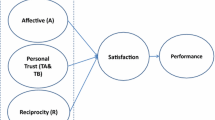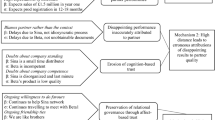Abstract
Betrayal is a very common, but relatively under-researched, dark side phenomenon in interfirm relationships that warrants investigation. We propose a conceptual model of the factors reducing betrayal intention in exporter-importer (E-I) working relationships and its resulting effect on actual betrayal. Using a random sample of 262 indigenous exporters of manufactured goods based in Greece, we confirm that betrayal intention in their relationships with foreign buyers is significantly and positively affected by four key parameters, namely, the existence of low trust, limited communication, absence of long-term orientation, and loose social bonds. An importer’s betrayal intention is subsequently very likely to develop into actual betrayal in the relationship. However, this likelihood is lower in the case of older relationships, as well as those characterized by contractual obligation between the interacting parties.
You have full access to this open access chapter, Download conference paper PDF
Similar content being viewed by others
Betrayal is a very common, but relatively under-researched, dark side phenomenon in interfirm relationships that warrants investigation. We propose a conceptual model of the factors reducing betrayal intention in exporter-importer (E-I) working relationships and its resulting effect on actual betrayal. Using a random sample of 262 indigenous exporters of manufactured goods based in Greece, we confirm that betrayal intention in their relationships with foreign buyers is significantly and positively affected by four key parameters, namely, the existence of low trust, limited communication, absence of long-term orientation, and loose social bonds. An importer’s betrayal intention is subsequently very likely to develop into actual betrayal in the relationship. However, this likelihood is lower in the case of older relationships, as well as those characterized by contractual obligation between the interacting parties.
Author information
Authors and Affiliations
Corresponding author
Editor information
Editors and Affiliations
Rights and permissions
Copyright information
© 2017 Academy of Marketing Science
About this paper
Cite this paper
Leonidou, L.C., Aykol, B., Fotiadis, T.A., Christodoulides, P. (2017). Betrayal Intention in International Business Relationships: Temporal and Contractual Moderating Effects (An Abstract). In: Rossi, P. (eds) Marketing at the Confluence between Entertainment and Analytics. Developments in Marketing Science: Proceedings of the Academy of Marketing Science. Springer, Cham. https://doi.org/10.1007/978-3-319-47331-4_7
Download citation
DOI: https://doi.org/10.1007/978-3-319-47331-4_7
Published:
Publisher Name: Springer, Cham
Print ISBN: 978-3-319-47330-7
Online ISBN: 978-3-319-47331-4
eBook Packages: Business and ManagementBusiness and Management (R0)




